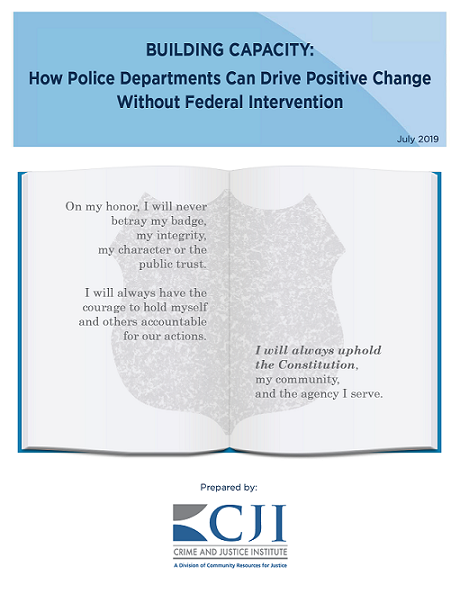
BOSTON, Massachusetts – A new resource developed by the Crime and Justice Institute (CJI) can help law enforcement leaders strengthen their departments through appraisals of their policies and practices through a constitutional lens. CJI’s report reviews 21 consent decrees and, from those, identifies the most common issues of unconstitutional policing, presents them in an accessible format for law enforcement leaders, and includes a tool for departments and stakeholders to conduct an assessment.
Implicitly embedded in the collection of consent decrees are the foundations of constitutional policing. The guidance woven into these legal documents provides vetted, prescriptive, and detailed steps to ensure police actions do not violate the rights of community members. Police departments can use these federal consent decrees by tailoring the mandates for other jurisdictions to address their own needs. Better practices in use of force; stops, searches, and arrests; and interactions with community members can lead to better community relations, improved safety for communities and police officers, and increased confidence and trust in the police.
“How community members see officers conduct themselves shapes the reputation of the department and influences compliance with the law, reporting of crime, and police-community relations,” said Christine Cole, Executive Director of CJI. “Improving relations and keeping the community and officers safe are predicated on updated policies, sound management, and quality training. Ideally, we’d like to see these powerful consent decrees inspire reform efforts across the country.”
CJI’s consent decree report, “Building Capacity: How Police Departments Can Drive Positive Change Without Federal Intervention,” funded by the Charles Koch Foundation, provides police executives and stakeholders an opportunity for self-assessment in areas such as policy, training, supervision practices, and data collection and analysis. Police executives can use the report’s accompanying checklist to identify areas for improvement and strengthen police practices proactively, enhancing their departments and improving community partnerships.
“Reviewing policies and practices against the benchmarks of consent decrees is extremely valuable for many reasons, including helping police leaders identify areas in need of attention,” said Charles Ramsey, former Commissioner of the Philadelphia Police Department. “If a goal of the police is to create a society where everyone, and their rights are safe and secure, then learning from consent decrees and achieving Constitutional policing is extremely important.”
Police departments often operate with decades-old policies. Many do not have the financial or legal resources for regular and comprehensive policy updates. Additionally, accreditation is not required, which is a mechanism that catalyzes regular review of the legality and currency of department policies.
“We should all be committed to this kind of reform work, and the self-assessment created by CJI is one great way to ensure departments work in partnership with their communities to keep the public safe,” said Vera Bumpers, President of the National Organization of Black Law Enforcement Executives (NOBLE). “It’s important that the community is involved in identifying, improving, and strengthening expectations of those who are policing them.”
The 1994 Violent Crime Control and Law Enforcement Act gave the federal government the power to sue police agencies if agencies exhibit a pattern or practice of violating people’s civil rights. A consent decree represents an agreement between a police department and the U.S. Department of Justice to change those practices. Since 1994, the federal government has scrutinized several dozen police departments in the U.S. after patterns or practices were alleged to be in violation of the U.S. Constitution.
About the Crime and Justice Institute
The Crime and Justice Institute (CJI), a division of Community Resources for Justice, strives to make criminal and juvenile justice systems more efficient and cost effective and to promote accountability for outcomes. CJI takes pride in its ability to improve evidence-based practices in safety and justice agencies, gain organizational acceptance in difficult work environments, create realistic implementation plans, put these plans into practice, evaluate their effectiveness, and enhance the sustainability of sound policies and practices. For more information, visit www.crj.org/cji.